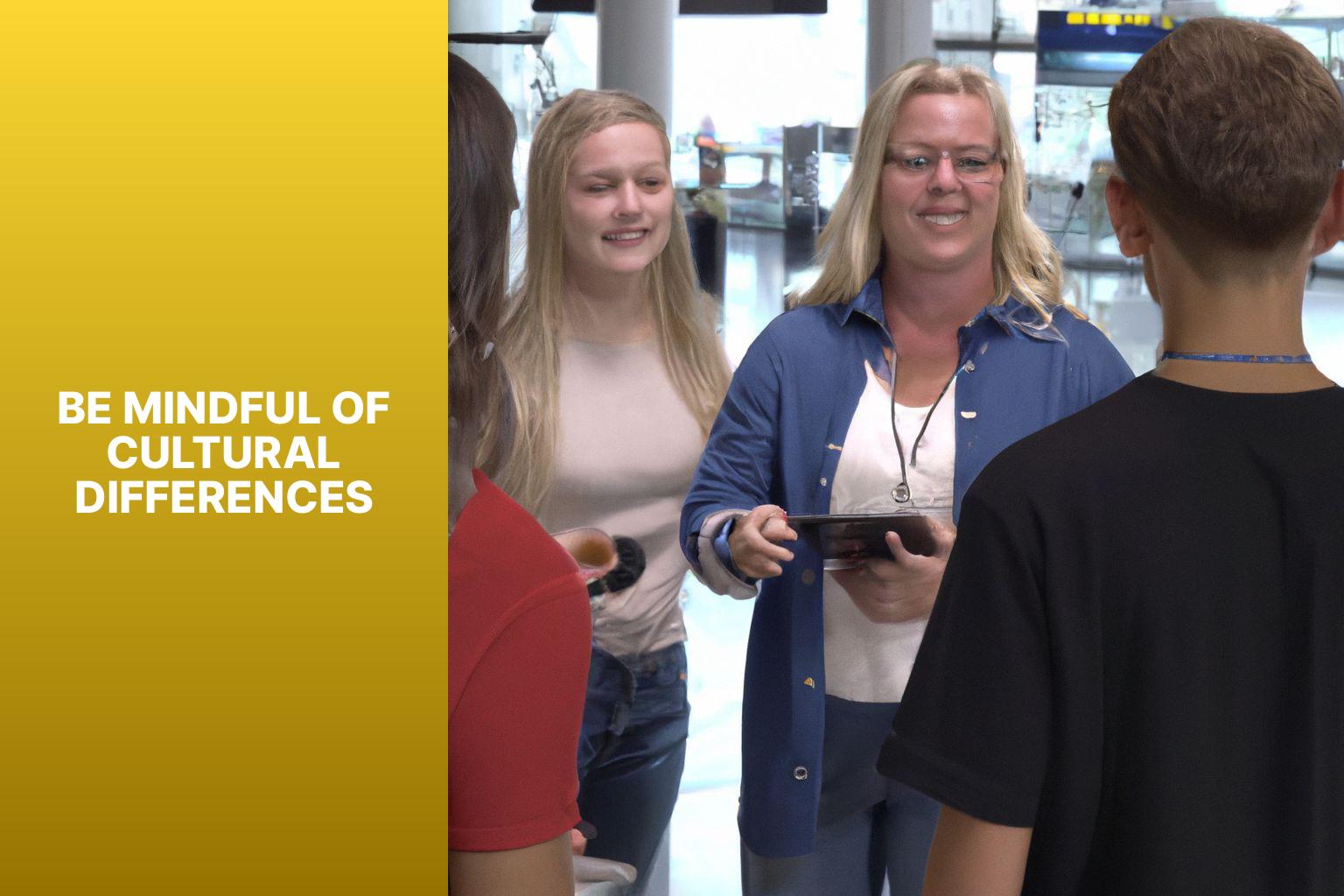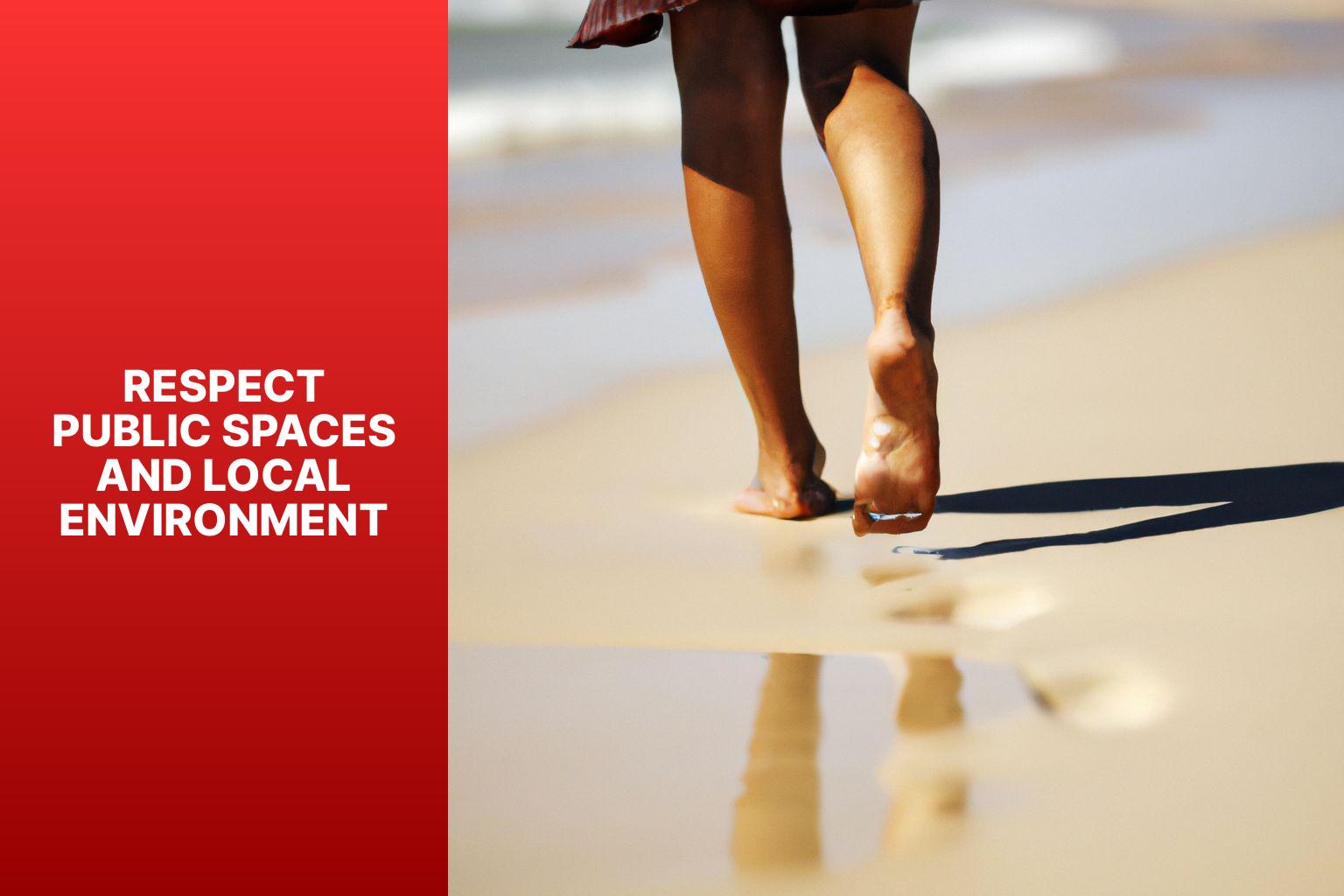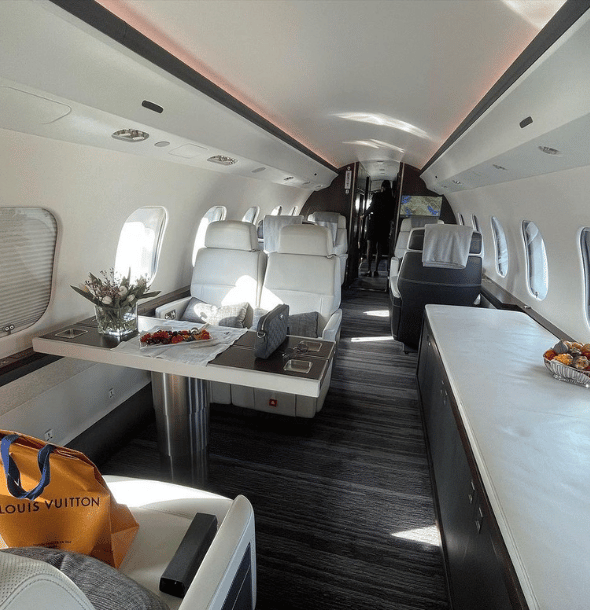Travel Etiquette: Being a Considerate Jet-setter
When jet-setting to new destinations, it is important to practice travel etiquette and be considerate towards the locals and fellow travelers. Being mindful of cultural differences, respecting public spaces, and exhibiting considerate behavior can greatly enhance your travel experience. traveling responsibly and handling travel challenges with grace are essential aspects of being a considerate jet-setter.
To start, it’s crucial to be aware of and respect cultural differences in the places you visit. This involves dressing appropriately, adhering to local customs and traditions, and learning basic local phrases to communicate with locals effectively.
Respecting public spaces and the local environment is another key aspect of travel etiquette. Keeping public areas clean by disposing of trash properly and following the rules and regulations of the destination helps preserve the beauty and integrity of the place.

Considerate behavior towards fellow travelers is also important. Being mindful of noise levels, respecting personal space, and practicing politeness and patience can contribute to a harmonious travel experience for everyone.
Traveling responsibly and ethically is crucial in minimizing the negative impact of tourism. Supporting local businesses by patronizing local establishments and conserving resources by being mindful of water and energy usage can contribute to sustainable and responsible travel practices.
Handling travel challenges with grace is essential. Staying calm in unexpected situations, adapting to changes, and resolving conflicts peacefully ensures a positive and enjoyable travel experience for yourself and those around you.
By embodying these principles of travel etiquette and being a considerate jet-setter, you can not only enhance your own travel experiences but also foster positive interactions and leave a positive impact on the places you visit.
Key Takeaways:
- Be mindful of cultural differences: Dress appropriately, respect local customs and traditions, and learn basic local phrases to show respect and appreciation for the local culture.
- Respect public spaces and local environment: Keep public areas clean and follow the rules of the destination to preserve the beauty and integrity of the place you are visiting.
- Exhibit considerate behavior towards fellow travelers: Be mindful of noise levels, respect personal space, and always be polite and patient to create a harmonious travel environment for everyone.
Be Mindful of Cultural Differences

Photo Credits: Www.Moderngentlemanmagazine.Com by Bruce Anderson
When traveling, it’s essential to be aware of and respect the cultural differences you may encounter. In this section, we’ll uncover the key aspects of being mindful of cultural differences. From dressing appropriately to respecting local customs and traditions, as well as learning basic local phrases, we’ll discuss how embracing these practices can enhance your travel experience and foster positive interactions with the diverse communities you encounter. Let’s embark on this journey of cultural understanding and become considerate jet-setters together.
Dress Appropriately
When traveling, it is vital to dress appropriately by considering the local customs and traditions. Here are some guidelines to follow:
– Before your trip, make sure to research the cultural norms and expectations regarding clothing. Some places may have conservative dress codes, while others may be more relaxed.
– When visiting religious sites or participating in religious events, it is important to dress modestly and respectfully. You may need to cover your shoulders, knees, or head as required.
– To be prepared for different dress codes or occasions without overpacking, pack versatile clothing that can be easily mixed and matched to create various outfits.
– Be mindful of clothing with offensive language, symbols, or images that may be considered disrespectful or inappropriate in the local culture.
– Take into account the weather conditions of your destination and pack accordingly. Dressing appropriately for the climate shows respect for the local environment and enhances your comfort during the trip.
– Pay attention to how the locals dress and follow their lead. This can help you blend in and avoid standing out as a tourist.
By dressing appropriately, you demonstrate respect for the local culture and contribute to a positive travel experience. Remember, every destination is unique, so it is essential to adapt your clothing choices accordingly.
Respect Local Customs and Traditions

Respecting local customs and traditions is vital when traveling to different destinations. By honoring the cultural practices of a country, you demonstrate respect for the local community and promote positive interactions. Here are crucial aspects to consider:
1. Dress Appropriately: Wearing appropriate attire is fundamental and can be seen as disrespectful in certain cultures. It is crucial to research and understand the proper dress code for various settings. For instance, when visiting religious sites or local communities in conservative countries, it is important to cover your shoulders and knees.
2. Respect Local Customs: Familiarizing yourself with the customs and traditions of the destination you are visiting is essential. For example, in some countries, it is customary to remove your shoes before entering homes or sacred places. Being aware of these customs can help you avoid unintentionally offending the locals.
3. Learn Basic Local Phrases: Demonstrating respect by learning a few basic phrases in the local language can greatly contribute to building connections. Greetings, thank you, and please are always appreciated. Even if you are not fluent, locals will value the effort you put into learning their language.
4. Follow Cultural Etiquette: Each culture has its own set of etiquette rules. For instance, in some cultures, it is considered polite to bow or refrain from pointing with your finger. It is important to be mindful of these practices to navigate social situations easily and show respect for the local culture.
Remember, respecting local customs and traditions is not only a matter of courtesy but also enhances your travel experience. By immersing yourself in the local culture, you enrich your journey and create lasting memories.
Learn Basic Local Phrases
Learning basic local phrases can greatly enhance your travel experiences and promote better communication with the locals. Understanding why it is important to learn these phrases is key:
- Communication made easy: When English is not widely spoken, knowing key phrases in the local language can help you effectively communicate with locals. Simple greetings, expressions of gratitude, and asking for directions can make interactions much smoother.
- Respect and appreciation for culture: By taking the time to learn basic local phrases, you demonstrate respect for the local culture and language. Locals appreciate your effort to engage with their language, resulting in more meaningful interactions.
- Smooth navigation of daily activities: Having knowledge of phrases for ordering food, inquiring about prices, or seeking assistance will help you navigate through daily activities more efficiently. This will help prevent any misunderstandings due to language barriers.
- Local insights at your fingertips: By learning local phrases, you increase your chances of receiving valuable recommendations and insights from locals. They may share hidden gems, local customs, or fascinating stories that you would otherwise miss out on.
- Building bridges and fostering connections: Engaging in the local language helps bridge the gap between cultures and fosters connections with locals. It demonstrates your genuine interest in the local community, leading to unforgettable experiences and potentially lasting friendships.
Take the time to learn some basic local phrases before embarking on your next trip. It will undoubtedly enhance your travel experience and leave a positive impression on the locals you encounter.
Respect Public Spaces and Local Environment

Photo Credits: Www.Moderngentlemanmagazine.Com by Larry Carter
When it comes to being a considerate jet-setter, respecting public spaces and the local environment is of utmost importance. In this section, we’ll dive into practical tips that will help you maintain cleanliness in public areas and adhere to the rules of your destination. From keeping the surroundings pristine to being mindful of local customs, we’ve got you covered on how to travel responsibly and leave a positive impact on the places you visit.
Keep Public Areas Clean
When traveling, remember to keep public areas clean for a respectful and pleasant environment. Here are some key points to consider:
1. Dispose of trash properly: Use designated trash bins and avoid littering in parks, streets, or beaches.
2. Clean up after yourself: When picnicking or eating in a public area, dispose of food containers, wrappers, and other waste in provided bins.
3. Avoid graffiti or vandalism: Respect public property by not defacing or damaging walls, buildings, or transportation.
4. Use public restrooms responsibly: Leave them clean after use, dispose of sanitary items properly, and report maintenance issues.
5. Follow local environmental regulations: Observe guidelines in natural spaces like national parks, staying on paths and not disturbing wildlife or leaving waste behind.
By practicing these habits, you can contribute to a cleaner and more enjoyable environment for locals and travelers alike. Remember, it is everyone’s responsibility to preserve the beauty of the places we visit.
Follow the Rules of the Destination

Photo Credits @lucabayati
When traveling to a new destination, it is important to follow the rules and regulations of that place. This ensures your safety and respect for the local culture and environment. Here are steps to follow when abiding by the rules of the destination:
1. Research before you go: Take time to research and familiarize yourself with the laws, regulations, customs, and cultural norms of your destination.
2. Respect local laws: Once you arrive, strictly adhere to all local laws and regulations, including traffic rules, guidelines for behavior in public spaces, and any specific rules in place.
3. Dress appropriately: Respect dress codes and guidelines, which may require covering shoulders or knees in certain religious or cultural sites.
4. Follow local customs and traditions: Be mindful of local customs and traditions, including greetings, gestures, and behavior in religious or sacred places.
5. Learn basic local phrases: Before you arrive, learn a few basic phrases in the local language. This shows respect and helps with communication and navigation.
By following these steps and respecting the rules of the destination, you ensure a more enjoyable and fulfilling travel experience. Remember to be a considerate traveler by respecting the local culture and environment wherever you go. Stay informed, embrace the uniqueness of each destination you visit, and have a wonderful journey.
Considerate Behavior Towards Fellow Travelers

Photo Credits @cafyfabio_official
When it comes to being a considerate jet-setter, it’s crucial to display considerate behavior towards our fellow travelers. In this section, we’ll unpack the key aspects of maintaining a harmonious travel experience. From being mindful of noise levels to respecting personal space and practicing politeness and patience, we’ll explore how these behaviors contribute to creating a positive and enjoyable journey. So let’s dive in and discover the essential etiquettes that will make us the ultimate considerate traveler!
Be Mindful of Noise Levels
When traveling, be mindful of noise levels to ensure a respectful experience for yourself and others. Consider the following factors:
-Avoid loud conversations and excessive laughter, especially in quiet or crowded areas. Being aware of your voice volume creates a peaceful environment.
-Use headphones or lower the volume on electronic devices like smartphones, tablets, or music players to avoid disturbing others. This is crucial in shared spaces like airplanes, buses, and hotels.
-Respect noise restrictions set by accommodations, such as hotels or guesthouses, during quiet hours. This allows for peaceful sleep and stay for everyone.
-Be considerate of your surroundings, especially in residential areas or cultural sites. Avoid playing loud music, shouting, or engaging in activities that disrupt the local community or disturb the tranquility of historical or sacred sites.
-Follow instructions and guidelines from tour guides during group activities or tours. This includes being mindful of noise levels in regulated areas.
-If fellow travelers cause noise disturbances, politely address the situation and communicate your concerns with respect to find a peaceful resolution.
By being mindful of noise levels, you can contribute to a more pleasant and harmonious travel experience for everyone involved.
Respect Personal Space
When traveling, respect personal space to ensure a pleasant experience for everyone. Here are some tips:
- Give people their personal space: In crowded places, give people room to move freely without feeling crowded or uncomfortable. Avoid standing too close to others in lines or public transportation.
- Avoid touching or leaning on others: Be mindful of your gestures and body language to avoid invading someone’s personal space. Do not touch or lean on others, as it can make them uncomfortable.
- Respect privacy in shared accommodations: In shared accommodations like hostels or shared vacation rentals, be considerate of your roommates’ personal space. Do not go through their belongings or invade their privacy.
- Ask for permission before taking photos: Always ask for permission before taking photos of other people, especially strangers. Respect their personal space and their right to privacy.
- Keep noise levels down: Be mindful of the noise you make, especially in public spaces where people may be trying to relax or work. Avoid loud conversations or playing music without headphones.
- Be aware of cultural differences: Different cultures may have different concepts of personal space. Research and understand the cultural norms of the destination you are visiting to avoid unintentionally invading someone’s personal space.
- Be attentive to non-verbal cues: Pay attention to non-verbal cues from others that indicate they may need more personal space or feel uncomfortable. If someone is stepping back or avoiding eye contact, it may be a sign that you are infringing on their personal space.
Respecting personal space while traveling shows consideration for others and allows for a more comfortable and positive experience for everyone involved.
Be Polite and Patient
When traveling, be polite and patient for a positive experience. Here are tips to maintain courtesy and patience during your journey:
- Respect personal space: In crowded places like airports, buses, or train stations, respect personal boundaries. Avoid pushing or invading someone’s space, as it can be uncomfortable and disrespectful.
- Practice good manners: Saying “please” and “thank you” shows politeness. Use polite language and show appreciation when interacting with hotel staff, tour guides, or fellow travelers to create a friendly and respectful atmosphere.
- Be patient with delays: Travel plans can be disrupted by unforeseen circumstances like flight delays or traffic jams. Instead of getting frustrated, remain patient and understanding. Remember that these situations are often beyond anyone’s control, and expressing anger or impatience will not resolve the issue.
- Listen actively: When engaging in conversations with locals or fellow travelers, actively listen to what they are saying. Show genuine interest and avoid interrupting or dominating the conversation. This demonstrates respect and consideration for others’ thoughts and opinions.
- Follow local customs: Each destination has its own cultural practices and traditions. Educate yourself about the local customs and norms before your trip. By respecting and following these customs, you show appreciation for the local culture and contribute to a harmonious travel experience.
Remember, being polite and patient while traveling creates a positive impression and helps cultivate an enjoyable and stress-free journey for everyone involved.
Traveling Responsibly and Ethically

Photo Credits @flighthacks
Traveling responsibly and ethically is not just a buzzword – it’s a mindset that can make a significant difference. In this section, we uncover the essence of being a considerate jet-setter by exploring two key aspects: supporting local businesses and conserving resources. Get ready to discover how your choices as a traveler can have a positive impact on the communities you visit and the planet as a whole. It’s time to embrace responsible travel and make every journey count.
Support Local Businesses
Supporting local businesses is crucial when traveling to contribute to the local economy and create sustainable livelihoods for the community. It is important to purchase goods and services from local vendors and establishments in order to preserve the unique character and charm of a destination. Supporting local businesses promotes cultural diversity and preserves traditional crafts and practices.
One way to support local businesses is by choosing locally-owned accommodations instead of large chain hotels. When looking for souvenirs, gifts, and everyday necessities, it is recommended to visit local markets and shops rather than international chains or tourist-focused establishments. It is beneficial to dine at locally-owned restaurants and cafes that serve authentic cuisine.
To enhance your travel experience and support local entrepreneurs, it is advised to engage with local guides, tour operators, and transportation services. Another way to make a positive impact is by participating in community-based tourism initiatives to learn about local culture. When deciding which businesses to support, it is essential to research and choose ones that align with ethical and sustainable practices, ensuring that your support truly benefits the local community.
By supporting local businesses, not only will you enhance your travel experience, but you will also contribute to the social and economic well-being of the destinations you visit.
Conserve Resources
Conserve Resources is crucial for responsible travel. Here are some ways to Conserve Resources while traveling:
- Reduce water consumption by taking shorter showers and turning off the tap when brushing your teeth.
- Save energy by turning off lights, air conditioning, and other electrical devices when not in use.
- Use public transportation like buses, trains, or trams instead of private cars to reduce carbon emissions.
- Pack reusable items such as a water bottle, coffee cup, and shopping bag to minimize single-use plastic.
- Choose eco-friendly accommodations that have implemented energy-saving practices and initiatives.
- Respect nature by avoiding littering and sticking to designated trails. Do not disturb or remove wildlife and plants.
- Support local conservation efforts by participating in community-led projects or donating to organizations that protect natural resources.
By following these practices, we contribute to the preservation of our planet’s resources while enjoying our travels.
Handling Travel Challenges with Grace

Photo Credits: Www.Moderngentlemanmagazine.Com by Robert Rivera
When it comes to traveling, challenges are inevitable. But how we handle those challenges can make all the difference. In this section, we’ll explore the art of handling travel challenges with grace. From staying calm and adaptable in unexpected situations to peacefully resolving conflicts, we’ll provide you with insights and strategies to navigate through the ups and downs of your journeys like a pro. So buckle up and get ready to enhance your travel etiquette by mastering the art of handling travel challenges with finesse!
Stay Calm and Adapt to Unexpected Situations
Staying calm and adapting to unexpected situations is crucial when traveling. By following a few steps, you can navigate through any challenges that may arise.
1. Maintain a positive mindset: Remain calm and positive when faced with unexpected situations. Take a deep breath and remind yourself that setbacks are a natural part of travel.
2. Stay informed: Keep up with the latest information about your travel plans. Check for weather updates, flight delays, or changes in transportation schedules. Being aware of potential disruptions will help you prepare and adapt.
3. Be flexible: Travel plans may not always go as expected, so be open to alternative solutions. If your flight is canceled, consider other routes or transportation options. Embracing flexibility will help you overcome obstacles and make the most of your travel experience.
4. Seek assistance: Don’t hesitate to ask travel professionals or local authorities for help in challenging situations. They can provide guidance and support to navigate through unexpected circumstances.
5. Prepare for contingencies: Have a backup plan for unforeseen events. This may include keeping extra funds for emergencies, carrying a first aid kit, or having copies of important travel documents.
By staying calm and adapting to unexpected situations, you can minimize stress and ensure a smoother travel experience. Remember, embracing the adventure and being open to new experiences is part of the excitement of travel.
Resolve Conflicts Peacefully
Resolving conflicts peacefully is crucial for travel etiquette. When conflicts arise while traveling, handle them calmly and respectfully. Here are steps to help resolve conflicts peacefully:
1. Stay calm: Keep a cool head when facing conflict. Approach the situation with a level-headed mindset.
2. Listen actively: Take time to listen to the other person’s perspective and understand their point of view. Show empathy and try to see the situation from their perspective.
3. Communicate effectively: Clearly express your concerns and frustrations without aggression or rudeness. Use “I” statements to explain how the conflict has affected you personally.
4. Seek common ground: Look for areas of agreement and propose solutions that benefit both parties. Finding a compromise can resolve conflicts amicably.
5. Apologize if necessary: If you made a mistake or unintentionally caused the conflict, apologize sincerely. Taking responsibility for your actions can defuse tense situations.
6. Involve a mediator if needed: If the conflict persists and cannot be resolved directly, consider a neutral third party like a tour guide or hotel staff.
7. Report serious issues: If the conflict involves illegal activities or poses a safety threat, report it to authorities or seek professional help.
By following these steps, conflicts can be resolved peacefully, creating a harmonious and enjoyable travel experience. Respectful and considerate behavior is key to being a conscientious traveler.
Frequently Asked Questions
What are some tips for packing in advance and traveling with good luggage?
When packing in advance, it’s important to invest in good luggage that is durable and easy to carry. Look for luggage with four wheels for easier maneuverability. Pack lightly and downsize your must-haves to avoid overpacking. Consider using packing cubes to fit more clothing into a small space and rolling your clothes to save space and prevent wrinkles.
How can I maintain a jetsetter mindset while traveling?
To maintain a jetsetter mindset, it’s important to check your attitude and approach each trip with confidence, open-mindedness, and a sense of adventure. Embrace the unexpected and be adaptable to different situations. Remember to listen to calming music during turbulence, accessorize with a big scarf and sunglasses, and dress stylishly to create a jetsetter image.
What are some travel etiquette tips for flying in economy class?
When flying in economy class, it’s important to be respectful of those around you. Keep your headphones at an appropriate volume and lower the brightness on your electronic devices. Avoid strong scents like garlic and onions, and be mindful of reclining your seat gently to not inconvenience the person behind you. Remember to allow those in front of you to disembark first and follow protocol.
How can I deal with annoying airline passengers?
Dealing with annoying airline passengers can be challenging, but there are some tips to navigate the situation. If someone is an armrest hogger, try inching your way in by placing just your elbow next to theirs. If someone invades your personal space, politely ask them to move their arm or bag slightly. If someone reclines their seat too far, you can recline your seat for more space or kindly ask them to pull their seat forward a bit. It’s important to handle these situations with politeness and respect.
What can parents do to alleviate children’s ear pain during flights?
Parents can prepare for their children’s ear pain during flights by carrying a bottle or pacifier to help their little ones swallow and relieve the pressure. Swallowing can help equalize the air pressure in the ears, preventing discomfort. It’s important for parents to be prepared and proactive in addressing their children’s needs during the flight.
How can I handle a surly flight attendant?
If you encounter a rude or surly flight attendant, it’s important to remain calm and avoid challenging them. Instead, jot down their name, flight number, and email a complaint to the airline company or share it on social media for faster results. By addressing the issue through proper channels, you can express your concerns and potentially see a resolution.
